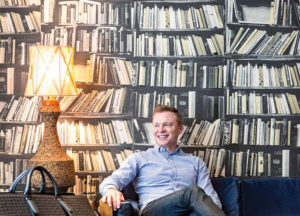Everyone likes a good story.
It doesn’t matter if you are talking to a potential investor, an engineer you really want to hire, your college roommate or a reporter. A story well told is remembered and impactful.
Some people are natural storytellers, able to weave together a narrative seemingly as an innate quality. For the rest of us, nailing our story takes focus and repetition – practice rivaling natural ability.
I’ve talked to dozens of founders and leaders over my career, at large companies like Google, Facebook and Lyft and smaller start-ups just getting going. Something I hear a lot is, “Brandon, perfecting the story can wait. We have work to do!”
But what if you are building a great product, and no one understands its value? Maybe no one can even figure out what it does. It all makes sense to you and your team, because you have repeated it to yourselves dozens of times. Your focus, rightly, is on what needs to get done next – it all makes sense in your head. But that’s a terrible place to keep your story.
Often, founders think the product needs to be finished – perfected – before the story can be built. But in waiting, you miss so many chances to tell your story to audiences who can have a real impact on your success. You encounter these opportunities constantly even in the earliest phases of building – hiring, raising money, attracting partners, and landing early customers. These are the early believers willing to take a chance on an idea, if they are convinced.
A good story process can help you think through important product differentiators, what matters most to customers, what hooks people to want to learn more or try the product. It can inform where you focus as you start to think about launching more broadly. It provides an outside lens, critical feedback and pinpoints the things that are going to make your story interesting to a wide audience. A good narrative tells the story of why you are going to win – and how.
A good story makes what is complex simple and what is simple interesting.
So what does the process look like? It’s designed to give you the opportunity to tell the whole story over the course of one or two hour-long meetings. I typically like to speak to a few team members separately – it is helpful to hear how people tell the story differently. It creates a rich data set of content to work with. We cover the basics – where the idea came from, how the founding team came together, the market need, the competition, the why. I will ask a lot of dumb questions (I am very good at this) to help me really pinpoint the simplest, most salient elements of the story. A good story makes what is complex simple and what is simple interesting.
From there, I begin writing out a long form, prose narrative, which we will edit together, usually over two or three iterations. I like a long format for a couple of reasons. One, I find that it helps people better internalize and repeat the story. Two, it becomes a piece of owned media you can use as is. You can post it on your blog in its entirety. You can use pieces as web copy, social media, or presentation content. It becomes a powerful tool to inform a PR strategy (your earned media). Many start-ups I work with don’t yet need an ongoing PR strategy; they need help with a launch or a funding announcement. Having your story ready drastically minimizes the upfront work you will need to do to successfully engage a PR consultant or firm. The story is foundational so you can build internal and external communications strategies on top of it.
It’s also important to understand what the story is not. It is not creative writing, but clear writing (no jargon!). Typically, it is not “news” (exceptions if you are building a rocket to Mars – call me if you are). It is not a press release, though it should include elements of what makes you interesting enough to write about. It is not set in stone – it should evolve as your product and business evolves.

The team at Oceans understands the power of a good story. They put the work in to help explain why their approach to venture capital is different, better. They were critical about their differentiators – what really matters to the founders they want to work with, how they explain the “magic” a hands-on, dedicated group of leaders and operators brings to a start-up. They debated, they wrote it down, they focused, they shared it. You believed.
Working together with the Oceans team, we are building story development into the early stage life cycle of our portfolio companies. We have heard from you there is a need and facilitating this process is something we want to give you dedicated access to as valued partners. Of course there is cost associated with this, but we believe the value is there. Stay tuned for an upcoming Oceans-hosted virtual event where we can discuss this in more detail, answer questions and meet Zoom-to-Zoom.
Brandon McCormick, Oceans friend and LP